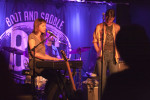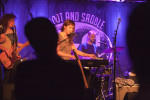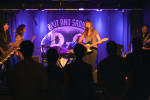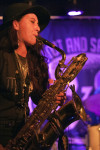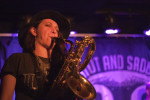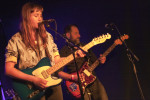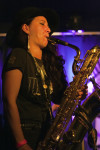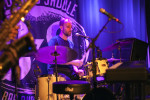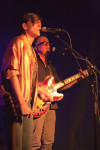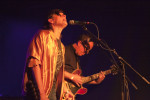by Michael Youngkin
“It always seems like a good idea,” said Holly Miranda from the stage Wednesday night at the Boot and Saddle. As her set warmed up, she took off her stylish jacket, complete with a VIP pass to a 1998 Sparklehorse show sewn into the lining. Sometimes honesty trumps cred.
Miranda’s latest self-titled album attempts to shed a prolonged bout with writer’s block for a cycle of honest, confessional songs. What passes for enjoyable headphone listening, however, does not always transfer to a live setting.
She began her set with album opener “Mark My Words” and immediately captured everyone’s attention. Holly Miranda’s voice is her main attraction, and it was front and center Wednesday night. It’s clear she’s a veteran performer, getting her monitor mix requests in early and displaying her adroit ability. Her voice fits in nicely with contemporaries Florence Welch or Grace Potter.
It’s possible, however, Holly Miranda is too comfortable. Her opening act was a well-known friend. Her band delivered predictable accompaniment. As background music at a cocktail hour, it was just fine. As the main attraction in a 100-person room, it falls regrettably flat.
It’s a shame, because Holly Miranda can sing. She has the power and finesse to deliver intimate lyrics in a whisper or a shout. I’d love to see her stuck with a mortal enemy for a drummer, or an ex-lover for a guitar player. It’d be sure to generate sparks, a commodity sorely lacking in Miranda’s music.
She seems to know it, too. Midway through the set, as the audience of two dozen stood frozen and silent between songs, she commented how polite everyone was, and how it was a little weird. There’s a long history of performers disagreeing with their audiences, from Bob Dylan to Igor Stravinsky. But in these cases, the artists provoked audiences to respond, however negatively, and initiated a conversation. When an audience fails to respond at all, it’s unfortunate for the performer, yes. But when the performer pokes at the audience for their lack of enthusiasm, well, it’s hard to justify the poking.
In our current culture of oversharing, honesty is often confused with banality. When the Ramones sing “I Wanna Be Your Boyfriend,” it’s a leather-clad act of vulnerability. Yes, it’s all performance art, but Joey Ramone plays the role of sensitive tough guy with ease. When Holly Miranda sings “All I Want is to Be Your Girl,” the only role she’s trying to play is that of singer-songwriter, and the audience was happy to oblige with polite applause and pin-drop silence.
The high point of the set came during “Desert Call,” a blue-eyed soul workout which asks, “Are we ever gonna make it on our own?” It’s apt question, because the tune was seriously buoyed by a burning baritone sax solo from Maria Eisen. She lent a vaguely mid-century, L.A. a la Phil Spector vibe with a solo that earned a mid-song burst of applause, the most enthusiastic audience response of the night.
Another highlight came when Miranda stepped out from behind her piano, put down her guitar, and belted a cover of a Morphine song. Suddenly, whatever barrier had existed was gone, and the song was light and unselfconscious.
Opener Ambrosia Parsley gave the audience advance warning: “I’m just gonna sing a bunch of sad songs.” Her delivery was somber, with a Juliana Hatfield-like scowl backed by some jazzy chords and harmonies from Chris Maxwell. “Lounge depression” comes to mind, and the effect was not entirely unenjoyable. Their harmonies were a highlight. His toying with stompboxes, perhaps an experiment on a sparse, inconsequential crowd, was not.
Near the end of their set, the pair covered the Big Star song, “Nighttime.” Maybe I was the only one in the crowd mouthing the words, and maybe that’s why they seemed like they wanted to just get it over with. Or maybe I’m just spoiled by listening to Alex Chilton sing it like his life is falling apart. While their rendition was more Sunday morning at the farmer’s market than scrawlings of a self-conscious mad man, it was fun to hear a new take on an old favorite.
- All photos by Michael Youngkin



